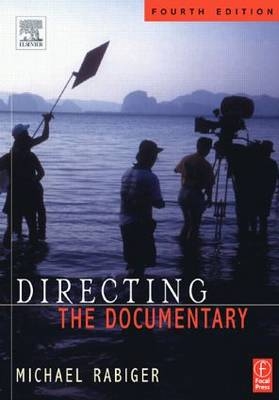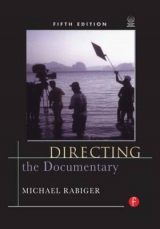
Directing the Documentary
Focal Press (Verlag)
978-0-240-80608-2 (ISBN)
- Titel erscheint in neuer Auflage
- Artikel merken
Tens of thousands of readers have benefited from Michael Rabiger's classic text on documentary filmmaking, now updated to reflect the revolutionary switch to digital video equipment and software. You will learn how to research and focus a documentary film or video idea, develop a crew, direct the crew, maintain control during shooting, and oversee postproduction. Practical work is emphasized, with dozens of exercises and questionnaires to help focus your ideas and give you hands-on practice. The documentary is treated as an important genre in its own right, as well as a useful prelude to directing feature films.
The fourth edition is a significant update. The book's emphasis has always been on concrete steps you can take to become a documentary filmmaker, and there are loads of new projects to help, along with assessment tables that allow you to gauge your progress. In addition, there is new material on location sound, the reality TV trend, top documentaries to see, and more.
Michael Rabiger has directed or edited over 35 films, founded the Documentary Center at Columbia College, Chicago, and was Chair of its Film/Video Department. Now Professor Emeritus, Rabiger has also been presented with the Preservation and Scholarship Award by the International Documentary Association. He has given workshops in many countries, led a multinational European documentary workshop for CILECT, the international association of film schools. As Visiting Professor at New York University's Tisch School of the Arts, he taught idea development, directing, and advanced production. When he retired 2001 to write full-time, Columbia renamed its documentary center "The Michael Rabiger Center for Documentary. In 2002 he was made Honorary Professor at the University of Buenos Aires, Argentina; in 2003 awarded the 2003 Preservation and Scholarship Award by the International Documentary Association in Los Angeles; in 2005 the Genius Career Achievement Award by the Chicago International Documentary Festival, and also in 2005 was made Professor Emeritus by Columbia College Chicago. He is the author of the enormously successful, Directing: Film Techniques and Aesthetics (Focal Press), now in its fourth edition, and Directing the Documentary (Focal Press), now in its fifth edition. He is also the author of Developing Story Ideas (Focal Press), currently in its second edition. He is currently writing a biography of Thomas Hardy.
Part 1: Introduction, History and Future
Ch. 1: The Director's Role
Ch. 2: A Brief and Functional History of the Documentary
Part 2: Aesthetics and Authorship
Ch. 3: Elements of the Documentary
Ch. 4: Evidence of Point of View in the Documentary
Ch. 5: Time, Development, and Structure
Ch. 6: Authorship Challenges and Opportunities
Ch. 7: Re-enactment, Reconstruction, and Docudrama
Ch. 8: Documentary Theory and the Issue of Representation
Ch. 9: Projects: Critical Writing
Part 3: Identity and Authorship
Ch. 10: Projects: Recognizing Your Artisitic Identity
Ch. 11: Developing Your Story Ideas
Part 4: Screencraft
Ch. 12: Screen Grammar
Ch. 13: Projects: Screencraft Analysis
Ch. 14: Projects Basic Production
Part 5: Preproduction
Ch. 15: Initial Research and the Draft Proposal
Ch. 16: Research Leading Up to the Shoot
Ch. 17: Missions and Permissions
Ch. 18: Developing a Crew
Ch. 19: The Preproduction Meeting
Part 6: Production
Ch. 20: Camera Equipment and Shooting Procedure
Ch. 21: Lighting
Ch. 22: Location Sound
Ch. 23: Avoiding Problems
Ch. 24: Interviewing
Ch. 25: Directing Participants
Ch. 26: Directing the Crew
Ch. 27: Authorship
Ch. 28: Projects: Advanced Production
Part 7: Postproduction
Ch. 29: Postproduction Begins
Ch. 30: The Paper Edit: Designing a Structure
Ch. 31: Editing: The First Assembly
Ch. 32: Editing: The Process of Refinement
Ch. 33: Narration
Ch. 34: Editing: The End Game
Ch. 35: Using Music and Working with a Composer
Ch. 36: Editing: From Fine Cut to Sound Mix
Ch. 37: Titles and Acknowledgments
Ch. 38: Projects: Postproduction
Part 8: Career Track
Ch. 39: Education
Ch. 40: Getting Work
Part 9: Other Information
Appendix 1: Projects: Outcomes Assessment Criteria
Appendix 2: Useful Forms
Filmography of Director Michael Rabiger
Glossary
Film Sources
Bibliography
Periodicals
Useful Websites
Index
| Erscheint lt. Verlag | 27.4.2004 |
|---|---|
| Verlagsort | Oxford |
| Sprache | englisch; portugiesisch |
| Maße | 178 x 254 mm |
| Themenwelt | Kunst / Musik / Theater ► Film / TV |
| Reisen ► Hotel- / Restaurantführer ► Welt / Arktis / Antarktis | |
| Sozialwissenschaften ► Kommunikation / Medien ► Medienwissenschaft | |
| ISBN-10 | 0-240-80608-5 / 0240806085 |
| ISBN-13 | 978-0-240-80608-2 / 9780240806082 |
| Zustand | Neuware |
| Haben Sie eine Frage zum Produkt? |
